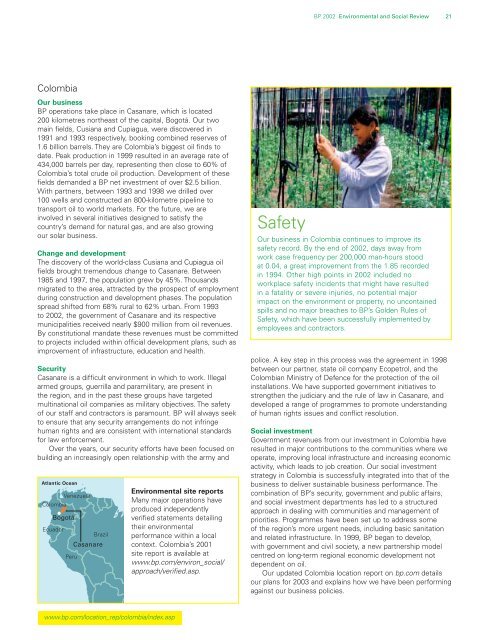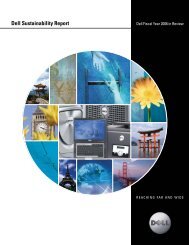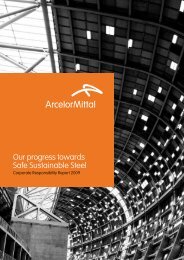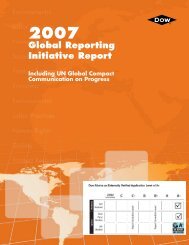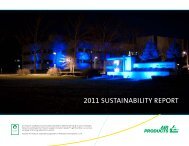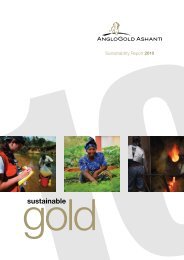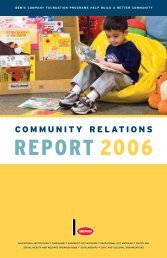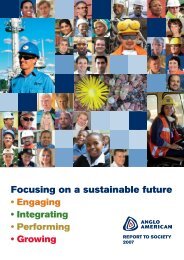English (pdf, 894KB) - BP
English (pdf, 894KB) - BP
English (pdf, 894KB) - BP
You also want an ePaper? Increase the reach of your titles
YUMPU automatically turns print PDFs into web optimized ePapers that Google loves.
<strong>BP</strong> 2002 Environmental and Social Review 21ColombiaOur business<strong>BP</strong> operations take place in Casanare, which is located200 kilometres northeast of the capital, Bogotá. Our twomain fields, Cusiana and Cupiagua, were discovered in1991 and 1993 respectively, booking combined reserves of1.6 billion barrels. They are Colombia’s biggest oil finds todate. Peak production in 1999 resulted in an average rate of434,000 barrels per day, representing then close to 60% ofColombia’s total crude oil production. Development of thesefields demanded a <strong>BP</strong> net investment of over $2.5 billion.With partners, between 1993 and 1998 we drilled over100 wells and constructed an 800-kilometre pipeline totransport oil to world markets. For the future, we areinvolved in several initiatives designed to satisfy thecountry’s demand for natural gas, and are also growingour solar business.Change and developmentThe discovery of the world-class Cusiana and Cupiagua oilfields brought tremendous change to Casanare. Between1985 and 1997, the population grew by 45%. Thousandsmigrated to the area, attracted by the prospect of employmentduring construction and development phases. The populationspread shifted from 68% rural to 62% urban. From 1993to 2002, the government of Casanare and its respectivemunicipalities received nearly $900 million from oil revenues.By constitutional mandate these revenues must be committedto projects included within official development plans, such asimprovement of infrastructure, education and health.SecurityCasanare is a difficult environment in which to work. Illegalarmed groups, guerrilla and paramilitary, are present inthe region, and in the past these groups have targetedmultinational oil companies as military objectives. The safetyof our staff and contractors is paramount. <strong>BP</strong> will always seekto ensure that any security arrangements do not infringehuman rights and are consistent with international standardsfor law enforcement.Over the years, our security efforts have been focused onbuilding an increasingly open relationship with the army andAtlantic OceanColombiaBogotáEcuadorVenezuelaPeruBrazilCasanareEnvironmental site reportsMany major operations haveproduced independentlyverified statements detailingtheir environmentalperformance within a localcontext. Colombia’s 2001site report is available atwww.bp.com/environ_social/approach/verified.asp.SafetyOur business in Colombia continues to improve itssafety record. By the end of 2002, days away fromwork case frequency per 200,000 man-hours stoodat 0.04, a great improvement from the 1.85 recordedin 1994. Other high points in 2002 included noworkplace safety incidents that might have resultedin a fatality or severe injuries, no potential majorimpact on the environment or property, no uncontainedspills and no major breaches to <strong>BP</strong>’s Golden Rules ofSafety, which have been successfully implemented byemployees and contractors.police. A key step in this process was the agreement in 1998between our partner, state oil company Ecopetrol, and theColombian Ministry of Defence for the protection of the oilinstallations. We have supported government initiatives tostrengthen the judiciary and the rule of law in Casanare, anddeveloped a range of programmes to promote understandingof human rights issues and conflict resolution.Social investmentGovernment revenues from our investment in Colombia haveresulted in major contributions to the communities where weoperate, improving local infrastructure and increasing economicactivity, which leads to job creation. Our social investmentstrategy in Colombia is successfully integrated into that of thebusiness to deliver sustainable business performance. Thecombination of <strong>BP</strong>’s security, government and public affairs,and social investment departments has led to a structuredapproach in dealing with communities and management ofpriorities. Programmes have been set up to address someof the region’s more urgent needs, including basic sanitationand related infrastructure. In 1999, <strong>BP</strong> began to develop,with government and civil society, a new partnership modelcentred on long-term regional economic development notdependent on oil.Our updated Colombia location report on bp.com detailsour plans for 2003 and explains how we have been performingagainst our business policies.www.bp.com/location_rep/colombia/index.asp


